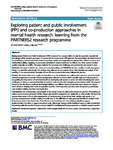Exploring patient and public involvement (PPI) and co-production approaches in mental health research: learning from the PARTNERS2 research programme
| dc.contributor.author | Allen, D | |
| dc.date.accessioned | 2021-09-21T11:41:24Z | |
| dc.date.available | 2021-09-21T11:41:24Z | |
| dc.date.issued | 2020-09-21 | |
| dc.identifier.issn | 2056-7529 | |
| dc.identifier.issn | 2056-7529 | |
| dc.identifier.other | 56 | |
| dc.identifier.uri | http://hdl.handle.net/10026.1/17902 | |
| dc.description.abstract |
<jats:title>Abstract</jats:title> <jats:sec> <jats:title>Background</jats:title> <jats:p>Patient and Public Involvement (PPI) in research is a growing field of work, incorporating experiential knowledge within research processes. Co-production is a more recent PPI approach that emphasises the importance of power-sharing to promote inclusive research practices, valuing and respecting knowledge from different sources, and relationship building. Applying co-production principles in research trials can be difficult, and there are few detailed worked examples or toolkits. This paper explores the successes and challenges encountered by one research team.</jats:p> </jats:sec> <jats:sec> <jats:title>Methods</jats:title> <jats:p>Our paper is written by a team of 21 people working on PARTNERS2, led by a smaller co-ordinating group. Using a co-operative style inquiry, the authors have reflected on and written about their experiences; analysis of the resulting 15 accounts provided examples of how PPI and co-production were delivered in practice.</jats:p> </jats:sec> <jats:sec> <jats:title>Results</jats:title> <jats:p>We reveal varied and complicated experiences as we developed our collaborative approach across the entire research programme. Four main themes emerge from reflective accounts which describe aspects of this process: (1) recognising the importance of ‘emotional work’; (2) developing safe spaces to create and share knowledge; (3) some challenges of using our personal identities in research work; and (4) acknowledging power-sharing within the research hierarchy. We also found continual relationship building, how different forms of expertise were valued, and stigma were central to shaping what work was possible together. Other important practices were transparency, particularly over decision making, and clear communication.</jats:p> </jats:sec> <jats:sec> <jats:title>Conclusions</jats:title> <jats:p>Our work provides one example of the ‘messy’ nature of collaborative research in practice. The learning we surface was contextual, generated within a large-scale research programme, but applicable to other studies. We found for success there needs to be an acknowledgement of the importance of emotional work, creating safe spaces to co-produce, transparency in decision making and reflection on the difficulties of using personal identities in research work including for service user researchers. These elements are more important than existing guidelines suggest. Implementation of actions to support emotional work, will require changes within individual teams as well as institutions. Introducing reflective practice in teams may be helpful in identifying further improvements to inclusive research practice.</jats:p> </jats:sec> | |
| dc.format.extent | 56- | |
| dc.format.medium | Electronic-eCollection | |
| dc.language | en | |
| dc.language.iso | en | |
| dc.publisher | BMC | |
| dc.subject | Collaborative methodologies | |
| dc.subject | Cooperative inquiry | |
| dc.subject | Experiential expertise | |
| dc.subject | Reflective accounts | |
| dc.subject | Service user researcher | |
| dc.title | Exploring patient and public involvement (PPI) and co-production approaches in mental health research: learning from the PARTNERS2 research programme | |
| dc.type | journal-article | |
| dc.type | Journal Article | |
| plymouth.author-url | https://www.ncbi.nlm.nih.gov/pubmed/32974052 | |
| plymouth.issue | 1 | |
| plymouth.volume | 6 | |
| plymouth.publication-status | Published | |
| plymouth.journal | Research Involvement and Engagement | |
| dc.identifier.doi | 10.1186/s40900-020-00224-3 | |
| plymouth.organisational-group | /Plymouth | |
| plymouth.organisational-group | /Plymouth/Faculty of Health | |
| plymouth.organisational-group | /Plymouth/Faculty of Health/Peninsula Medical School | |
| plymouth.organisational-group | /Plymouth/Research Groups | |
| plymouth.organisational-group | /Plymouth/Research Groups/Institute of Translational and Stratified Medicine (ITSMED) | |
| plymouth.organisational-group | /Plymouth/Research Groups/Institute of Translational and Stratified Medicine (ITSMED)/CCT&PS | |
| plymouth.organisational-group | /Plymouth/Users by role | |
| plymouth.organisational-group | /Plymouth/Users by role/Academics | |
| dc.publisher.place | England | |
| dcterms.dateAccepted | 2020-07-27 | |
| dc.rights.embargodate | 2021-9-22 | |
| dc.identifier.eissn | 2056-7529 | |
| dc.rights.embargoperiod | Not known | |
| rioxxterms.versionofrecord | 10.1186/s40900-020-00224-3 | |
| rioxxterms.licenseref.uri | http://www.rioxx.net/licenses/all-rights-reserved | |
| rioxxterms.licenseref.startdate | 2020-09-21 | |
| rioxxterms.type | Journal Article/Review |


